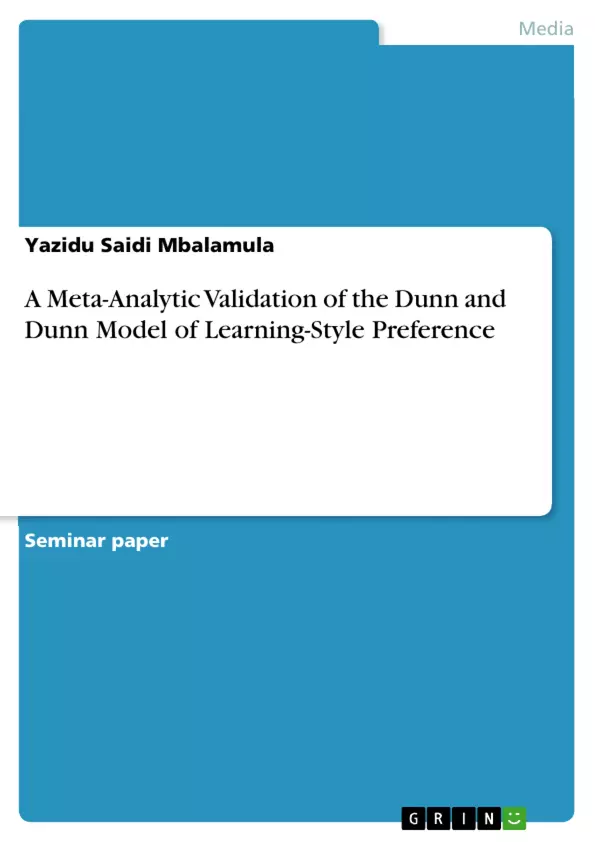The intrinsic nature of learning process where a learner manifests changes in behavior as result of experience has provoked serial debates in Education Research. The discussions range from “what”, “when”, “how” and “where” would a learner be able to perform; which not only view a learner as subject of knowledge but also an ultimate object for knowledge generation. The differences in performance among learners are evident and require an extensive investigation to improve and maintain. However, the fundamental question remains as to “why” students’ performance is different; this is a crucial starting point to understand the different ways “style” which a learner use in the daily learning processs (Brown, 1994; Sorenson, 2011).
In this article, the study sought to analyze the hypothesis that “accommodating students’ learning-style preferences increase academic achievement”. The study analysis delimits to understanding of how various factors influence how students learn and their consequential effect on academic achievement. The study extarcted research studies through computer-based survey; fourty two studies out of 138 were rated by Lytton and Romney’s rating scales, then 6 of 42 were discarded following inherent validity threat. The sample of 3181 from 36 studies was thereafter subjected to meta-analysis.
Through Meta-analysis cummulative effect size r of .353 was calculated with residual variance of 0.79, the latter converted to Mean Standard Deviation (MSD) d of .755. The measures complemented to standard normal curve, revealing that the academic achievement of students will increase three fourths (3/4) when learning learning style are accommodated than those whose learning styles have not been accommodated.
Generally the findings from the study established the fact that to ensure optimal academic achievement, it is inevitably necessary to understand and account (i.e. implication for instructional interventions) for the factors that best provide or compliment the students’ affection and passion (style) to learning of particular subject (s).
Summary
The intrinsic nature of learning process where a learner manifests changes in behavior as result of experience has provoked serial debates in Education Research. The discussions range from “what”, “when”, “how” and “where” would a learner be able to perform; which not only view a learner as subject of knowledge but also an ultimate object for knowledge generation. The differences in performance among learners are evident and require an extensive investigation to improve and maintain. However, the fundamental question remains as to “why” students’ performance is different; this is a crucial starting point to understand the different ways “style” which a learner use in the daily learning processs (Brown, 1994; Sorenson, 2011).
In this article, the study sought to analyze the hypothesis that “accommodating students’ learning-style preferences increase academic achievement”. The study analysis delimits to understanding of how various factors influence how students learn and their consequential effect on academic achievement. The study extarcted research studies through computer-based survey; fourty two studies out of 138 were rated by Lytton and Romney’s rating scales, then 6 of 42 were discarded following inherent validity threat. The sample of 3181 from 36 studies was thereafter subjected to meta-analysis.
Through Meta-analysis cummulative effect size r of .353 was calculated with residual variance of 0.79, the latter converted to Mean Standard Deviation (MSD) d of.755. The measures complemented to standard normal curve, revealing that the academic achievement of students will increase three fourths (3/4) when learning learning style are accommodated than those whose learning styles have not been accommodated.
Generally the findings from the study established the fact that to ensure optimal academic achievement, it is inevitably necessary to understand and account (i.e. implication for instructional interventions) for the factors that best provide or compliment the students’ affection and passion (style) to learning of particular subject (s).
Description of the Research Design
- The research design is Quantitative and experimental
-The data were extracted through computer-based search and 36 Experimental research studies were sampled
-Measurement of effect size – Coefficient of Correlation (r) made from transformation of quantitative statistical tests from the studies (means, f ratios , t tests and Chi squares)
-The study sought to investigate on what conditions when accommodated affects learners’ academic achievement (controlled conditioning)
Frequently asked questions
What is the main focus of the research summarized here?
The research analyzes the hypothesis that accommodating students' learning-style preferences increases academic achievement. It investigates how various factors influence how students learn and their consequential effect on academic success.
What research design was employed in the summarized study?
The research design is quantitative and experimental. It uses a meta-analysis of 36 experimental research studies collected through a computer-based search.
How was the effect size measured in the study?
The effect size was measured using the Coefficient of Correlation (r), which was derived from transformations of quantitative statistical tests (means, f ratios, t tests, and Chi squares) from the included studies.
What were the main findings of the meta-analysis?
The meta-analysis revealed a cumulative effect size r of .353, which translates to a Mean Standard Deviation (MSD) d of .755. This indicates that students whose learning styles are accommodated are likely to experience a significant increase in academic achievement compared to those whose learning styles are not accommodated.
What is the practical implication of the study's findings?
The findings suggest that understanding and accounting for the factors that best support students' affection and passion (style) for learning a particular subject is essential for optimal academic achievement. This has implications for instructional interventions designed to cater to different learning styles.
What was the time period for the included studies?
The data collection design was cross-sectional, utilizing data from different studies conducted across a ten-year period, from 1980 to 1990.
How many studies were included in the meta-analysis?
Initially, forty-two studies were rated. However, after assessing validity, 36 studies with a sample size of 3181 students were subjected to meta-analysis.
- Quote paper
- Yazidu Saidi Mbalamula (Author), 2014, A Meta-Analytic Validation of the Dunn and Dunn Model of Learning-Style Preference, Munich, GRIN Verlag, https://www.grin.com/document/271450



